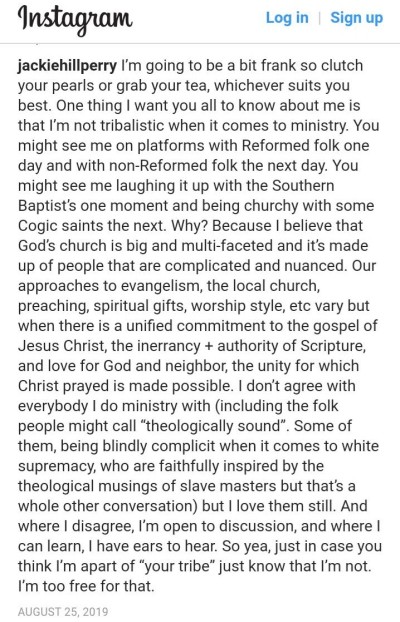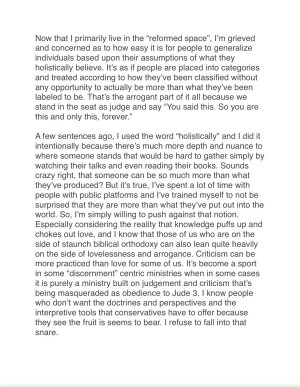If your theology pretty much matches up with mine (as outlined in my “Welcome” and “Statement of Faith” tabs in the blue menu bar at the top of this page) and you’d like to contribute a guest post, drop me an e-mail at MichelleLesley1@yahoo.com, and let’s chat about it.
For more information on Jackie Hill-Perry, please click here.

A Review of Jackie Hill-Perry’s
“Jude: Contending for the Faith in Today’s Culture”
by: Thomas Coutouzis
There is an old adage that says, “You can’t judge a book by its cover”. The implication is that the outward appearance of a book is not a reliable indicator of the content. This can be true at times, however, I have found more often than not that you actually can judge a book by its cover, probably more today than ever. In the case of Jackie Hill-Perry’s study on Jude, you can indeed judge a book by its cover. I will tell you why shortly.
I was asked if I would read the Jackie Hill-Perry study on Jude and write a review since I have written a commentary on Jude. I have studied extensively in Jude and have a passion for defending the faith which was once for all handed down to the saints. Our Lord doesn’t need us to defend His truth or His name, but He chooses to use us and charges us to contend against false teaching.
I don’t know much about Ms. Perry. I saw her in the excellent documentary made by Brandon Kimber called, American Gospel: Christ Alone. In this documentary she and a multitude of other saints presented the tenets of the prosperity gospel and began to dismantle them piece by piece with Scripture until you could see the man-made anti-Christ teaching it really was. What was surprising is when she posted pictures on social media of her with a variety of false teachers. The first thought that immediately popped into my mind was, “How can you teach a study on Jude and then go and befriend those who preach a false gospel?” These two things cannot coexist together. After all, the apostle Paul said, “Do not be bound together with unbelievers; for what partnership have righteousness and lawlessness, or what fellowship has light with darkness?” 2 Corinthians 6:14. Not to mention that we should not even give a false teacher a greeting (2 John 10-11). My suspicion was that Ms. Perry didn’t fully understand the text and as I read and listened to our dear sister’s messages I found that this is most likely the case.
I started with looking over the cover first. As a person with an Ad Agency background I found that the cover missed the entire theme of Jude. Jude is a polemic epistle. Polemic comes from the Greek word πόλεμος (polemos), which means “war/battle/fight”. Thus Jude is a call to arms for the church to stand up and go to war with false teachers. In verse 3, Jude challenges the believer to contend for the faith earnestly (ἐπαγωνίζομαι – epagonizomai). It gives us our English word, “agonize”. The word denotes a struggle against a competitor or enemy. In this case, Jude is using the word figuratively to describe going to battle against an enemy. It is combat against a foe. The word is used in the present tense denoting that the believer is to constantly combat false teachers. False teachers will never rest spreading heresy, neither should we stop opposing them with the truth. With this said, the cover (image at the top of this article) was an intersection on a city street with three cross walks and various people making their way to and fro. This cover in no way encapsulates the theme of Jude. It is a misrepresentation of the message of this epistle. The theme of Jude is a fight against those wolves in sheep’s clothing who have sneaked into the church with the purpose of turning it away from God. My commentary has a shield with two swords on the cover. This sets the tone for what you are about to read. Unfortunately, the creative team at LifeWay and Ms. Perry missed the mark on the cover for this study.
In this study Ms. Perry did six teaching segments and one summary segment. That said, Her teaching segments skipped over verses 12-13 and 16-19 which are very significant to understanding the text. However, the book does cover these, but not in any depth. Ms. Perry is a godly woman who has a passion for her King. The Lord has saved her, like all of us, from a life of great rebellion. You can see the love and passion she has for Him as she presents each of her messages.
In listening to the first segment (Jude 1-2) Ms. Perry understands that Jude is starting off his letter gently for a reason. The words that follow are going to be strong so he wants to make sure that the elect understand that their faith is secure before he drops some hard words regarding apostates. She makes this point very clear. She also speaks to Jude reminding them that the elect’s faith is secure for all time.
What I believe was missing in her teaching and the book was the historical context for Jude. What ancient heresies were around when Jude wrote the book that would give insight to his remarks? How do we know Jude was Jesus’ brother and not Judas son of James? There are Scriptures that prove Jude was Jesus’ brother, but why were they not cited as proof to whom this was (Mark 6:3)? There are also Scriptures that point to Jude’s unbelief in Christ like John 7:5. These are all important not only in pointing to lineage and authorship, but that God redeemed him (Acts 1:14) from his unbelief and why he is so passionate to contend for the faith. How can we understand the book if we don’t understand the man’s roots?
In the section of the book that covered Jude 1-2 I was perplexed as to why there was teaching about how the ancients wrote letters. The book displayed a letter from a Roman soldier named Apion and wanted the reader to compare them to Paul’s greetings in Ephesians 1:1-2, 1 Corinthians 1:1-3, and John’s greeting in Revelation 1:4-5. It struck me more as a filler to take up space rather than to help the reader to understand what this letter means.
In verse 3, Ms. Perry does not define the Greek word for “contend earnestly” (ἐπαγωνίζομαι – epagonizomai), but she does speak to one aspect of its usage which was regarding a struggle in athletic contests. Fighting to win the wreath. Indeed, the people of this time would be familiar with the Olympic games and the struggle to win, but that is not how Jude is using this word. Epagonizomai” combines the preposition “epi” meaning, “focused on” and “agon” which means “a contest”. In Greek, a preposition intensifies the meaning of the word to show the ferocity of the fight. In this case, Jude is using it figuratively for military combat. A fight in which your very life hangs in the balance and you must fight until the last breath. This is your enemy, not a competitor. You shake hands after a contest with a competitor. In battle, your enemy will gloat over your dead body because he seeks your destruction. Such are false teachers. They seek your destruction. The term is in the present tense which indicates that challenging false teachers is a constant. The Christian is to do this until he breathes his last.
Jude 3 is the cornerstone of the epistle. If you incorrectly interpret this verse, then the meaning of the rest of the book will crumble to the ground. Ms. Perry misses the militaristic intent. This term would indeed be recognized by the hearer in the context of Rome and its gladiators who would “epagonizomai”. This misunderstanding might be why Ms. Perry has associated with apostates like Jenn Johnson. She doesn’t see them as a threat to her or Christ. If you don’t see your enemy as a threat he is going to lure you in and destroy you.
To further show where Ms. Perry misses the mark on this verse, she rightly posits in the accompanying teaching video (#2) that those who contend with hatred in their hearts are wrong. There are infamous discernment blogs out there that excoriate both apostate and brethren alike, attacking their character more than the error. There is no civility. She gives an example of people holding up picket signs “outside”. It struck me as a reference to the infamous Westboro Baptist Church. They certainly are filled with hatred, thus in need of redemption. Ms. Perry states, “It might be that these people have contended for the faith wrong because they have taken the imagery of contending and divorced it from love.” I believe she is referring to these people with picket signs who have hatred in their hearts and not to the church to which Jude wrote his epistle. It was hard to tell. Right after saying this she posits that because Jude called these Christians “beloved” and said “may love be multiplied to you” that Jude is telling them that they are to contend for the faith in love. She further explains, “So when he (Jude) tells them to contend for the faith, love is to be assumed as an active participant in how they do it.”
First, she is reading something into the text that is not there. This is eisegesis (reading one’s own bias into the text that is not the author’s original intent). There is no connection with Jude’s greeting regarding his love for them and love being multiplied to them that would imply that he is exhorting them to contend for the faith in love, especially with his gut punch to them in verse 3. When I first heard this it almost sounded as if she was suggesting that the recipients of this epistle were not contending for the faith in love, but as I listened to it for context a few more times I don’t believe that she was drawing this conclusion.
Regardless, the aforementioned eisegesis of Jude exhorting the church to contend for the faith in love stands. The believers in Jerusalem were passive toward sin. These Christians were allowing false teachers to be a part of the church, thereby allowing in heresy, and turning believers away to a different Christ. Jude is emphatically calling believers to arms to fight against these heretics who have sneaked in. They are going to need to start church discipline immediately because when Jude’s letter is read, they will recognize these wolves. Some of these apostates might be their friends with whom they must now have hard conversations. Relationships will be severed and hearts will be broken.
Ms. Perry didn’t really explain in depth what contending for the faith in love looks like. We certainly should contend for the faith without maligning the character of others or abusive speech. Ms. Perry didn’t distinguish the line other than hatred, cynicism, and cruelty. I was under the impression that there is no room for stern reproofs for apostates. I believe Titus 1:13 and some of Paul’s stern reproofs (See 1 Corinthians 5, 2 Corinthians 12-13, and Galatians) would not side with her. You can be loving and stern in a rebuke, especially when someone is extremely hard-hearted. Ultimately, we should care so much about others’ well being that they see our kindness and care for them, but this doesn’t negate that there might be a time when words need to be stronger in order to penetrate a heart hardened by sin.
This leads me to my next point. In terms of the depth of the study and application, I found this study to be severely lacking. The book’s subtitle is, “Contending for the Faith in Today’s Culture”, but there are no examples of modern day apostasy. Jude clearly points out the attributes of apostates. These were not taught in the teaching video, but the book did scratch the surface of some of these attributes. Many of the study questions asked, “What do you think…?” instead of “What does the text mean?” The “What do you think?” questions lead to subjective answers rather than objective. The line between truth and error is blurred with subjective questioning. When we read a text we want to discern what God actually means.
Here are more examples:
Regarding Jude 6 and the angels that were having sex with women and spawning a super race: “Do you think God should have judged them? Why or Why not?”
Why would you ask that question? Of course they should have been judged!
What was so surprising is that there was no application as to how this relates to identifying an apostate. The study showed the demons in the abyss as a clear judgment from God, but did not relate it to the coming judgment of apostates who are like these demons. The book and teaching didn’t make the correlation that these demons went outside of God’s sexual boundaries that he established in Genesis 2:24. One of the easiest things to discern is that apostates live to go outside the boundaries that God sets with His Law. In this case, and in the case of Sodom, Jude is showing that apostates are the foremost of the sexually immoral. Where there is a sex scandal in the church, you will find an apostate. They will break every one of God’s sexual boundaries, whether heterosexual sex outside of marriage, homosexuality, polyamory, pedophilia, incest, rape, etc. Sexual sin is a judgment from God, but that is never discussed, nor pointing out that men and women in the church venturing outside of God’s sexual boundaries are most likely unregenerate.
Regarding Jude 8 when Jude refers to apostates as dreamers, Ms. Perry gives the transliterated word “enupniazomai”, but doesn’t define it. Why would you give the Greek word that Jude uses and no definition? It means “in a dream state/in a dream while asleep.” Jude is obviously using this term figuratively to denote that apostates are daydreamers. They daydream about sex, money, fame, luxury, and even revenge. Daydreams are a form of self-exaltation. Apostates will go to whatever end to get these things that they lust after; thus they defile their flesh. False teachers do declare divine revelation through dreams, but that is not what they are doing here because these dreams that Jude speaks of lead them to defile their flesh.
Regarding Jude 12-13, questions were asked like:
“What four elements of nature did Jude use to describe the ungodly teachers?” Questions like this will not aid the reader in understanding what Jude means when he says apostates are “autumn trees without fruit, doubly dead, uprooted;”.
There are many more examples that I could give, but it is not necessary. I don’t believe this study will thoroughly equip you for battle against apostates, not all of which are infamous false teachers like Steven Furtick or TD Jakes. Many are small town church pastors or congregants in our own churches that are either dormant or actively working to lead people away from God. They are regular church attenders like you and me.
With this study we can judge a book by its cover. It is not that the study is heresy, rather it barely scratches the surface of a potent book. I can only speculate as to why Ms. Perry after teaching a study on Jude would associate with those who meet all the criteria Jude gives for apostasy. This epistle should aid in our discernment of counterfeit Christians. If it doesn’t, then we are not heeding the necessity with which Jude wrote this book and commands us to contend earnestly for the faith until we are called home.
Thomas Coutouzis is the author of Agonizing For The Faith: A Biblical Exposition of Jude as well as an epic fantasy series that is partial allegory called Athanasia (The Great Insurrection (part 1) and The Unknown Lands (part 2)). Thomas resides in North Carolina with his wife and two children, is an expositional Bible teacher at his church. He welcomes you to follow him on Twitter.
 Book Giveaway: Thomas would like to bless two readers with a copy of his book Agonizing For The Faith: A Biblical Exposition of Jude. To enter the giveaway, drop Thomas an e-mail at thomascoutouzis@gmail.com before 11:59 p.m., Friday, April 24 and let him know something you liked or learned from his review of Jackie Hill-Perry’s book. Thomas will choose the winners and notify them by e-mail.
Book Giveaway: Thomas would like to bless two readers with a copy of his book Agonizing For The Faith: A Biblical Exposition of Jude. To enter the giveaway, drop Thomas an e-mail at thomascoutouzis@gmail.com before 11:59 p.m., Friday, April 24 and let him know something you liked or learned from his review of Jackie Hill-Perry’s book. Thomas will choose the winners and notify them by e-mail.





















